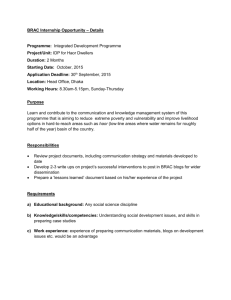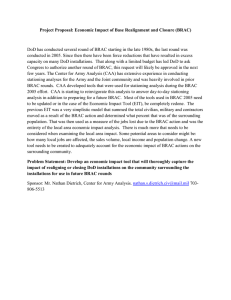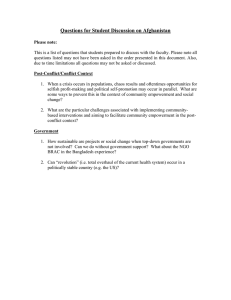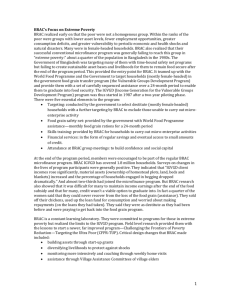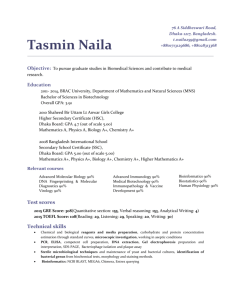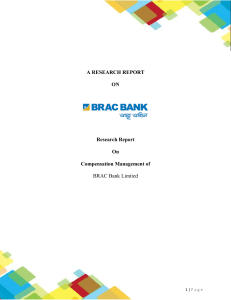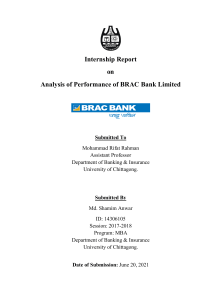Military Life References Century. Fairfax, VA:
advertisement
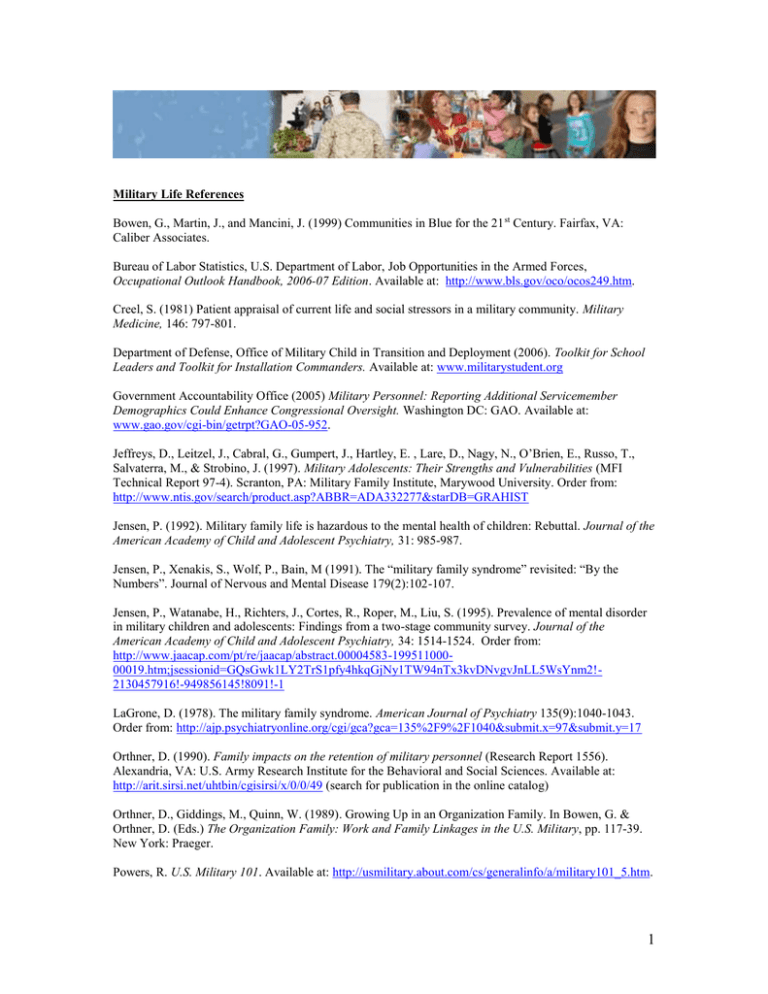
Military Life References Bowen, G., Martin, J., and Mancini, J. (1999) Communities in Blue for the 21 st Century. Fairfax, VA: Caliber Associates. Bureau of Labor Statistics, U.S. Department of Labor, Job Opportunities in the Armed Forces, Occupational Outlook Handbook, 2006-07 Edition. Available at: http://www.bls.gov/oco/ocos249.htm. Creel, S. (1981) Patient appraisal of current life and social stressors in a military community. Military Medicine, 146: 797-801. Department of Defense, Office of Military Child in Transition and Deployment (2006). Toolkit for School Leaders and Toolkit for Installation Commanders. Available at: www.militarystudent.org Government Accountability Office (2005) Military Personnel: Reporting Additional Servicemember Demographics Could Enhance Congressional Oversight. Washington DC: GAO. Available at: www.gao.gov/cgi-bin/getrpt?GAO-05-952. Jeffreys, D., Leitzel, J., Cabral, G., Gumpert, J., Hartley, E. , Lare, D., Nagy, N., O’Brien, E., Russo, T., Salvaterra, M., & Strobino, J. (1997). Military Adolescents: Their Strengths and Vulnerabilities (MFI Technical Report 97-4). Scranton, PA: Military Family Institute, Marywood University. Order from: http://www.ntis.gov/search/product.asp?ABBR=ADA332277&starDB=GRAHIST Jensen, P. (1992). Military family life is hazardous to the mental health of children: Rebuttal. Journal of the American Academy of Child and Adolescent Psychiatry, 31: 985-987. Jensen, P., Xenakis, S., Wolf, P., Bain, M (1991). The “military family syndrome” revisited: “By the Numbers”. Journal of Nervous and Mental Disease 179(2):102-107. Jensen, P., Watanabe, H., Richters, J., Cortes, R., Roper, M., Liu, S. (1995). Prevalence of mental disorder in military children and adolescents: Findings from a two-stage community survey. Journal of the American Academy of Child and Adolescent Psychiatry, 34: 1514-1524. Order from: http://www.jaacap.com/pt/re/jaacap/abstract.00004583-19951100000019.htm;jsessionid=GQsGwk1LY2TrS1pfy4hkqGjNy1TW94nTx3kvDNvgvJnLL5WsYnm2!2130457916!-949856145!8091!-1 LaGrone, D. (1978). The military family syndrome. American Journal of Psychiatry 135(9):1040-1043. Order from: http://ajp.psychiatryonline.org/cgi/gca?gca=135%2F9%2F1040&submit.x=97&submit.y=17 Orthner, D. (1990). Family impacts on the retention of military personnel (Research Report 1556). Alexandria, VA: U.S. Army Research Institute for the Behavioral and Social Sciences. Available at: http://arit.sirsi.net/uhtbin/cgisirsi/x/0/0/49 (search for publication in the online catalog) Orthner, D., Giddings, M., Quinn, W. (1989). Growing Up in an Organization Family. In Bowen, G. & Orthner, D. (Eds.) The Organization Family: Work and Family Linkages in the U.S. Military, pp. 117-39. New York: Praeger. Powers, R. U.S. Military 101. Available at: http://usmilitary.about.com/cs/generalinfo/a/military101_5.htm. 1 Schumm, W. R., Bell, D. B., Palmer-Johnson, C. E., Tran, G. (1994). Gender Trends in the U.S. Army and a Discussion of Implications for Readiness and Retention. Psychological Reports, 74: 499-511. Order from: http://ejournals.ammonsscientific.com/ Segal, D. and Segal M. (2004) America’s Military Population. Population Bulletin 59(4). Washington DC: Population Reference Bureau. Available at: http://www.prb.org/Template.cfm?Section=Population_Bulletin1&template=/ContentManagement/Content Display.cfm&ContentID=12460 Thomas, P. and Thomas, M. (1993). Mothers in Uniform. In: Kaslow, F. (Ed.) The Military Family in Peace and War. New York, NY: Springer Publishing Company. The Washington Post/Kaiser Family Foundation/Harvard University Military Families Survey (2004). Available at: http://www.kff.org/kaiserpolls/upload/Military-Families-Survey-Toplines.pdf BRAC Information: Department of Defense (2005). BRAC: Frequently Asked Questions. Available at: http://www.defenselink.mil/brac/faqs001.html. Miles, D. (2005) BRAC Deadline Expires; DoD to Begin Closures, Realignments. American Forces Information Service, November 9, 2005. Available at: http://www.dod.mil/news/Nov2005/20051109_3280.html. 2
